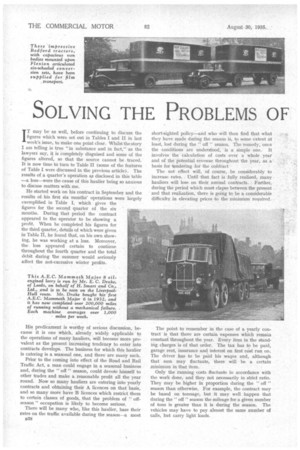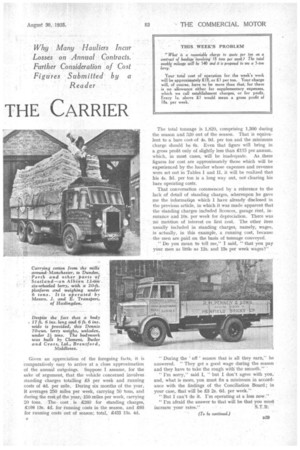SOLVING THE PROBLEMS OF THE CARRIER
Page 44

Page 45

If you've noticed an error in this article please click here to report it so we can fix it.
IT may be as well, before continuing to discuss the figures which were set out in Tables I and II in last week's issue, to make one point clear. Whilst the story I am telling is true "in substance and in fact," as the lawyers say, it is completely disguised and some of the figures altered, so that the source cannot be traced.
It is now time to turn to Table H (some of the features of Table I were discussed in the previous article). The results of a quarter's operation as disclosed in this table —a loss—were the cause of this haulier being so anxious to discuss matters with me.
He started work on his contract in September and the results of his first six months' operations were largely exemplified in Table I, which gives the figures for the second quarter of the six months. During that period the contract appeared to the operator to be showing a profit. When he completed his figures for the third quarter, details of which were given in Table II, he found that, on his own show ing, he was working at a loss. Moreover, the loss appeared certain to continue throughout the fourth quarter and the total debit during the summer would seriously affect the not-excessive winter profits.
His predicament is worthy of serious discussion, be cause it is one which, already widely applicable to the operations of many hauliers, will become more pre valent as the present increasing tendency to enter into contracts develops. The business for which this haulier is catering is a seasonal one, and there are many such. Prior to the coming into effect of the Road and Rail Traffic Act, a man could engage in a seasonal business and, during the " off " season, could devote himself to other trades and make a reasonable profit all the year round. Now so many hauliers are entering into yearly contracts and obtaining their A licences on that basis, and so many more have B licences which restrict them to certain classes of goods, that the problem of " offseason " occupation is likely to become serious.
There will be many who, like this haulier, base their rates on the traffic available during the season—a most B38
short-sighted policy—and who will then find that what they have made during the season is, to some extent at least, lost during the " oft' season. the -remedy, once the conditions are understood, is a simple one. It involves the calculation of costs over a whole year and of the potential revenue throughout the year, as a basis for tendering for the contract
The net effect will, of course, be considerably to increase rates. Until that fact is fully realized, many hauliers will lose on their annual contracts. Further, during the period which must elapse between the present and that realization, there is going to be a considerable difficulty in elevating prices to the minimum required.
The point to remember in the case of a yearly contract is that there are certain expenses which remain constant throughout the year. Every item in the standing charges is of that order. The tax has to be paid, garage rent, insurance and interest on first cost run on. The driver has to be paid his wages and, although that sum may fluctuate, there will be a certain minimum in that item.
Only the running costs fluctuate in accordance with the work done, and they not necessarily in strict ratio. They may be higher in proportion during the " off " season than otherwise. For example, the contract may be based on tonnage, but it may well happen that during the "off "season the mileage for a given number of tons is greater than it is during the season. The vehicles may have to pay almost the same number of calls,. but carry light loads.
Given an appreciation of the foregoing facts, it is comparatively easy to arrive at a close approximation of the annual outgoings. Suppose I assume, for the sake of argument, that the vehicle concerned involves standing charges totalling £5 per week and running costs of 4d. per mile. During six months of the year, it averages 250 miles per week, carrying 50 tons, and during the rest,of the year, 150 miles per week, carrying 20 tons. Thecost is £260 for standing charges, £108 13s. 4d. for running costs in the season, and £65 for running costs' out of season; total, £433 13s. 4d. • The total tonnage is 1,820, comprising 1,300 during the season and 520 out of the season. That is equivalent to a bare cost-of 4s. 9d. per ton and the minimum charge should be Os. Even that figure will bring in a gross profit only of slightly less than £115 per annum, which, in most cases, will be inadequate. As these figures for cost are approximately those which will be experienced by the haulier whose expenses and revenue were set out in Tables I and II, it will be realized that his 4s. 3d. per /on is a long way out, not clearing his bare operating costs.
That conversation commenced by a reference to the lack of detail of standing charges, whereupon he gave me the informati9n which I have already disclosed in the previous article, in which it was made apparent that the standing charges included licences, garage rent, insurance and 10s. per week for depreciation. There was nd inention of interest on first cost. The other item usually included in standing charges, namely, wages, is -actually, in this example, a running cost, because -the men are paid on the basis of tonnage conveyed.
"Do you mean to tell me," I said, "that you pay your men as little as 12s.. and 13s per week wages?"
" During the ' off ' season that is all they earn," he answered. " They get a good wage during the season and they have to take the rough with the smooth."' "I'm sorry," said I, "but I don't agree with you, and, what is more, you must fix a minimum in accordance with the findings of the Conciliation Board; in your case, that will be £3 2s. 6d. per week."
"But I can't do it. I'm operating at a loss now." "I'm afraid the answer to that will be that you must increase your rates."
(To be continued.) B39












































































